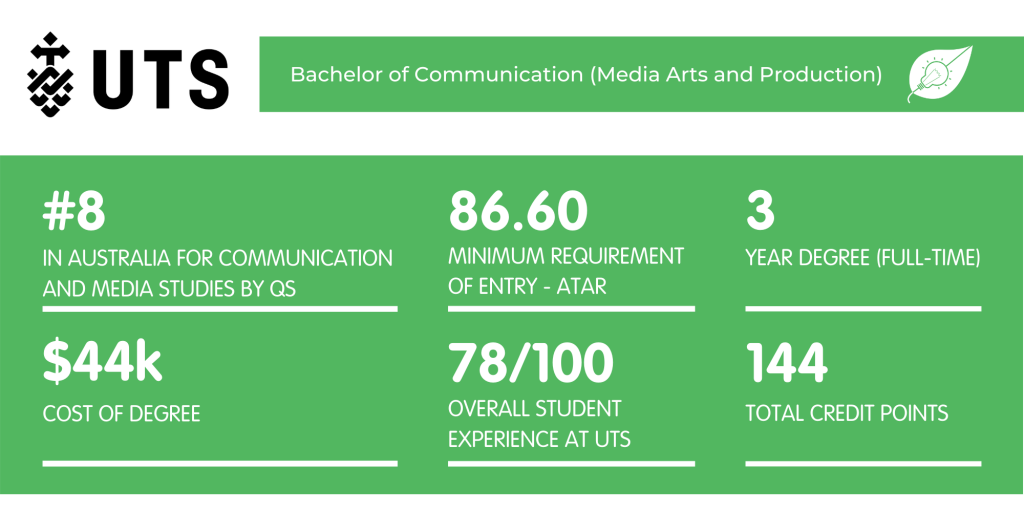
Thinking about majoring in Media Arts and Production at UTS?
Well, look no further because we’ve got you covered. We’ve laid out everything you need to know about the units, culture, assessments and what it’s really like to study a Bachelor of Communication majoring in Media Arts and Production at UTS.
Let’s dive right in!
What is UTS Media Arts and Production?
Core Units for this Degree
How to Get into UTS Media Arts and Production
What’s the Teaching Format?
What’s the Faculty and Culture Like?
What is UTS Media Arts and Production?
A Bachelor of Communication is a course that involves the study of the humanities and social sciences. At UTS, you’ll study a Bachelor of Communications with the option of majoring in either one or two undergraduate disciplines — so, along with a major in Media Arts and Production, first year students will select a second major that they may choose to continue for the rest of their degree.
The majors offered to Communications students at UTS include:
- Media Arts and Production
- Creative Writing
- Digital and Social Media
- Journalism
- Public Communication
- Social and Political Sciences
Once you complete your first year at UTS, you may choose to continue both of your majors or you may choose to solely focus on Media Arts and Production, meaning you will complete the required credit points by choosing from a diverse range of electives!
At UTS, a major in Media Arts and Production will encourage you to explore your interest in sound, film, video and new media whilst developing conceptual and practical skills that are highly sought after in the industry.
While you evolve as a creative producer, you’ll deepen your understanding of the theories, practices, histories and challenges of creative media by working across multiple genres and media. You’ll also develop a professional portfolio that will showcase your best work — so you’ll be pretty much set for the industry once you graduate.
Honours
If you’re keen on an additional year of study, and have received the required marks, UTS offers its Media Arts and Production students the opportunity to continue their studies through an honours program. As a Media Arts and Production student, you can apply to the Bachelor of Communications (Honours) where you will specialise in a particular field of communications and gain a competitive edge.
If you decide that you’re interested in completing an Honours degree in Communication at UTS, you can expect to undertake advanced coursework and produce an extensive research project based on your chosen field.
Career Paths
By majoring in Media Arts and Production you can expect your Communications degree to provide you with the skills for the following career paths:
- Cinematographer
- Documentary maker
- Scriptwriter
- Sound designer
- Multimedia designer
- Program commissioning editor
- Editor
- Director
- Producer
- Researcher
Check out other careers you might want to explore with a Bachelor of Communication here!
Core Units for this Degree
Alongside the core Communication units (which you can look at further here), a student majoring in Media Arts and Production at UTS can expect their core subjects to look a little something like this:
First Year
- Exploring Media Arts: This is a unit that offers students an introduction to media arts. You will get to learn a bit about everything from audio and video to mixing and editing.
- Composing the Real: As another introductory unit, this subject explores the production and conceptual approaches to documentary making. For example, you’ll learn to create your own short documentary across a range of media.
Second Year
- Fictions: This group-based unit focuses on dramatic, narrative and fictional storytelling. As another introductory unit, you’ll learn how narrative and drama are used in different filmmaking forms. You’ll get to work in different crew roles which are assigned to you throughout the project.
- Aesthetics: This is an experimental unit which mostly allows you to work on individual projects. You will learn about the development of aesthetic ideas by exploring your own approach to composition and form across multiple genres.
Third Year
- Media Arts Specialist Modules: In this unit, you will get the opportunity to select a module that you plan on specialising in, such as screenwriting, directing, producing, sound, post-production to develop and refine practical skills.
- Media Arts Project: This capstone subject will get you to finalise your degree by completing a small media arts project in a specialisation of your choice.
You can look into your subjects more here!
Internships
UTS Media Arts and Production doesn’t require students to partake in an internship. However, there are electives that you can choose once you finish your first year that will allow you to focus on obtaining industry experience.
The ‘Professional Internship elective gives Media Arts and Production students the opportunity to spend 40-100 hours in a workplace or approved virtual internship.
UTS also has a Careers page, so you can easily have a look at internship opportunities, work experience and career advice.
How to Get into UTS Media Arts and Production
Students hoping to study UTS Media Arts and Production should aim to get a minimum 86.60 ATAR. But don’t stress! There are alternative admission pathways that you can have a look at here.
Pathway Programs
Another way to get into the Bachelor of Communications degree is by studying a Diploma of Communication through UTS College (formerly known as UTS Insearch). You’ll have the choice between a Standard 12 month diploma, an Accelerated 8 month diploma or an Extended 16 month diploma.
You’ll need an average HSC mark of 67% (based on English marks and 3 non VET subjects) to meet the entry requirements for the Standard diploma, an average HSC mark of 63% (based on English marks and 3 non VET subjects) to get into the accelerated diploma and an average HSC mark of 63% (based on English marks and 3 non VET subjects) to meet the Extended diploma’s requirement. So, there are heaps of other ways to get into the degree!
Scholarships
UTS offers a wide range of scholarships for its students. This includes scholarships for domestic students, international students and for Aboriginal Australian or Torres Strait Islander students.
By scrolling down to the ‘Scholarships and prizes’ section, you’ll be able to see whether you’re eligible here!
What’s the Teaching Format?
A student majoring in Media Arts and Production at UTS will undergo their studies by completing two semesters each year — with pretty long breaks in between! Your classes will be mainly taught through lectures and tutorials.

Lectures
Lectures at UTS will typically last an hour with around 100 to 200 other students in the lecture theatre with you. For a Media Arts and Production student, a standard lecture will involve the lecturer explaining the content from a presentation — so you’ll get a chance to jot down some notes while you’re in there since the lectures will inform future tutorials.
Tutorials
Tutorials are much smaller, with around 20 to 30 students in each class. Especially as a Media Arts and Production, you can expect a very interactive environment — classes are more conversational and hands-on with a lot of participation from class members. You will also usually be given class time to work on your assessments.
How much time do you spend at university?
The number of contact hours tend to change as you progress through your degree, meaning tutorials may increase while lectures become less prioritised. However, it is safe to say that as a first year, your contact hours will generally include three 2-hour tutorials and three 1-hour lectures a week — a tutorial and lecture for each class.
Overall, if everything is face-to-face, you can expect to be on campus for approximately 12 hours a week to account for time you may be studying in the library.
What are the assessments like?

As a Media Arts Student at UTS, you’ll only be completing assignments rather than exams. This means that instead of memorising all of your content for a written exam, you will be marked on practical projects and research assignments — with quite a lot of group work.
Skills That You Refine and Learn

A Bachelor of Communications majoring in Media Arts and Production at UTS is a multifaceted degree that will teach you a wide range of skills. Alongside developing your practical knowledge in filmmaking, directing, screenwriting and producing, you can expect to gain theoretical and conceptual knowledge of media art history and culture.
You will learn to become an effective communicator as you work in teams to complete a variety of hands-on projects. You will gain critical thinking and problem solving skills so that you’ll be confident and prepared for the industry once you graduate.
What’s the Faculty and Culture Like?
Faculty
As a Media Arts Student, you can expect to feel extremely supported by the staff at the Faculty of Arts and Social Sciences. If you show initiative in reaching out and being interested in work experience, the staff will always suggest opportunities on offer.
At UTS, the casual and full-time staff will work hard to assist you wherever they can and help you land that dream job!
Culture
Since UTS is located in a bustling part of the city, there are plenty of things going on from society meetings to university events. Even as you make your way to your class, you’ll often come across stalls or events run by students. UTS offers its students the opportunity to join almost every theme of society under the sun!
At the beginning of your degree, you are encouraged to join the Media Arts and Production Facebook group which not only allows you to get to know your peers, but it’s a great place to reach out and find opportunities within the industry.
“I landed my first job at Sydney Film Festival from the Facebook group which was fantastic. Having not had much internship or work experience and then being able to get a job from that community was really great.” — Anna Dvorak
Students majoring in Media Production and Arts are friendly, vibrant and always willing to create friendships and relationships.
Support Programs
There are lots of support and mentorship programs that are offered at UTS. This may include academic assistance or social support.
UTS has a team dedicated to assisting students in every way, you can find out about UTS’ HELPS here!
Resources
Media Arts and Production students have access to over 1,500 pieces of professional equipment like DSLR cameras, microphones, lighting, huge green screens as well as ADR and Foley recording studios.
If you take on this degree, you will be given lots of resources to utilise and tutors are always willing to help out whether you’d like to arrange an in-person meeting or if you’d just like to discuss something over an email.
Thinking about the pros and cons of this degree? Check out our article here!
Gemma Billington is a Content Writer at Art of Smart and an undergraduate student at the University of Technology Sydney. While studying Journalism and Social and Political Sciences, Gemma enjoys spending her time at the gym or reading about Britain’s medieval monarchy – ideally not at the same time. She currently creates and administers social media posts for Central News and writes for the student publication, The Comma. After completing her undergraduate degree, she hopes to study a Masters of Medieval History and is very excited about the prospect!


